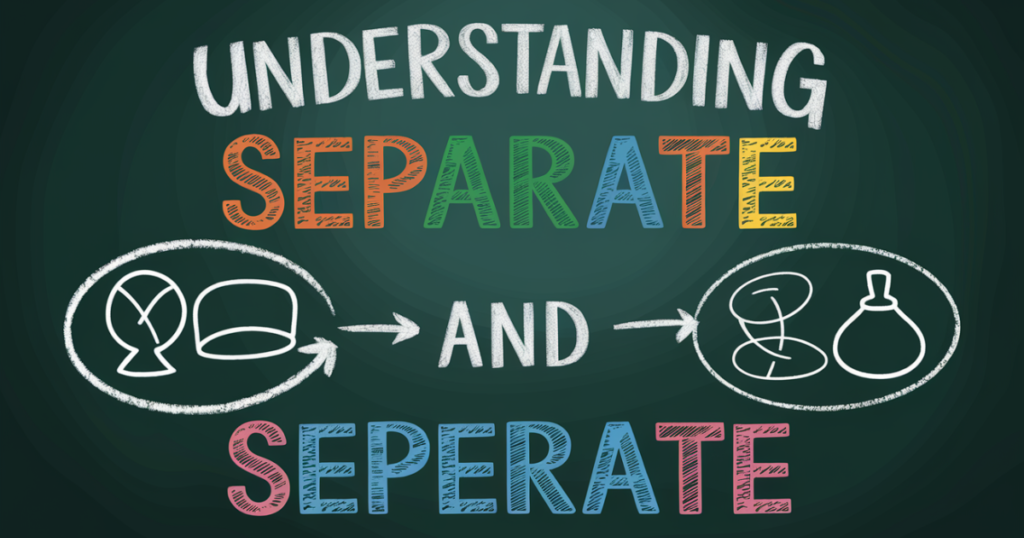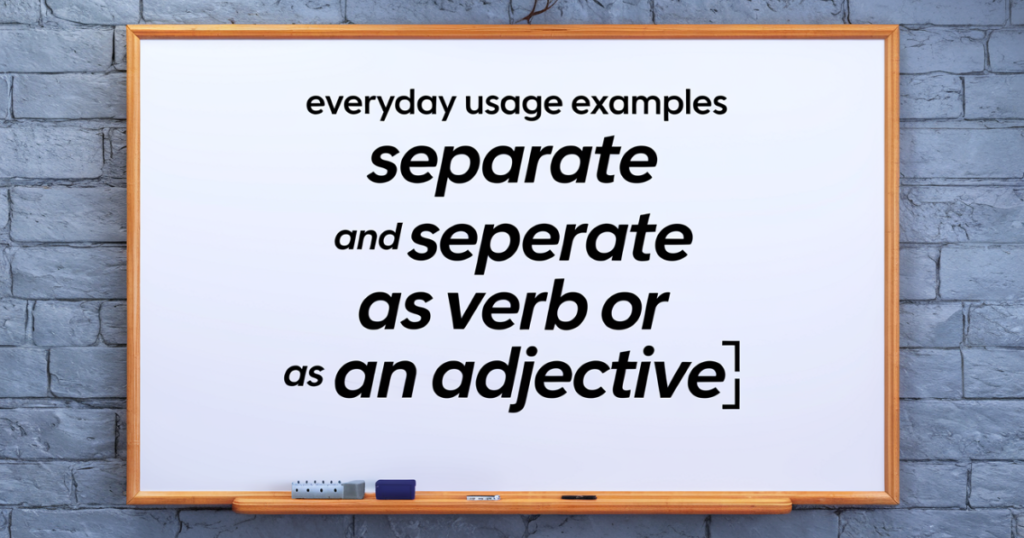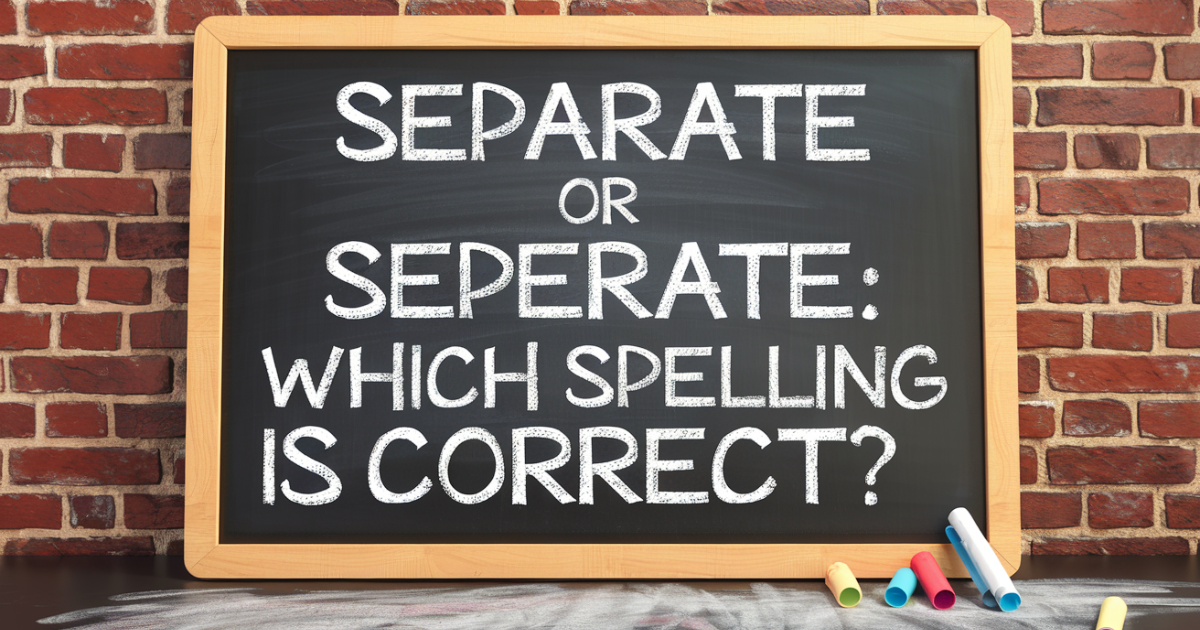Have you ever been stumped by the spelling of separate or seperate? You’re not alone! Many people, including native English speakers, often confuse the two. The error is so common that it’s hard not to second-guess yourself when writing. But knowing the correct spelling and understanding why it’s right can help you avoid this frequent pitfall.
In the world of spelling challenges, “separate” stands out as one of the most misspelled words in English. The mix-up usually happens because of how the word sounds when spoken. People often spell it as “seperate” because the pronunciation doesn’t clearly emphasize the correct vowel. So, which spelling should you use? Let’s dive in and clear up the confusion once and for all.
Understanding Separate And Seperate

Separate: Definition and Usage
The word “separate” means to divide or keep apart. It can function as both a verb and an adjective. As a verb, it describes the action of causing a division or creating space between things. As an adjective, it refers to things that are distinct or not connected.
Verb Example: She had to separate the laundry into dark and light colors before washing.
Adjective Example: They stayed in separate rooms during their vacation.
You Also Like To Read This: Heal Or Heel: Understanding The Differences
Seperate: Definition and Usage
The term “seperate” is a common misspelling of the word “separate.” It frequently appears in both informal and formal writing, often because the pronunciation doesn’t clearly emphasize the second “a.” Despite how often it is seen, “seperate” is incorrect and should always be avoided. Remembering the correct spelling of “separate” is essential for polished and professional communication.
Always double-check your spelling to make sure you’re using the correct version: “separate” with an “a” in the middle.
Side-by-Side Comparison
For further clarification we see side by side comparison of separate and separate:
| Word | Correct or Incorrect | Definition | Usage Examples | Key Difference |
| Separate | Correct | To divide or keep apart; distinct or not connected | Verb: Please separate the books by genre. | Spelled with an “a” in the middle; always correct |
| Adjective: They have separate schedules. | ||||
| Seperate | Incorrect | Common misspelling of “separate”; does not have meaning | Incorrect: He needs to seperate the tasks. | Spelled with an “e” in the middle; always incorrect |
The table provides a clear comparison between “separate” and “seperate.” “Separate” is the correct spelling, used both as a verb and an adjective to convey the idea of dividing or distinguishing things. It features an “a” in the middle, which is crucial to remember. On the other hand, “seperate” is simply a common misspelling and should never be used in formal or informal writing. The key difference lies in the vowel used: “a” makes it correct, while “e” makes it incorrect.
Everyday Usage Examples

In our daily language, “separate” is used in various contexts, both as a verb and as an adjective.
Here are some detailed examples that demonstrate how “separate” fits naturally into different situations:
Verb Example 1: She will separate the recyclable items from the trash.
Explanation: Here, “separate” is used as a verb, meaning to divide or sort items based on their type.
Verb Example 2: Can you separate the red and blue pencils in the box?
Explanation: In this example, “separate” refers to the action of distinguishing and sorting the pencils by color.
Verb Example 3: They decided to separate the children into smaller groups for the activity.
Explanation: “Separate” is used to describe the action of dividing the children into different groups.
Adjective Example 1: The two rooms are separate from each other.
Explanation: “Separate” as an adjective describes that the rooms are distinct or not connected.
Adjective Example 2: They stayed in separate hotels during the trip.
Explanation: In this sentence, “separate” indicates that the hotels are different or not shared.
Adjective Example 3: The twins have separate personalities.
Explanation: “Separate” is used to show that the twins are distinct in their characteristics.
FAQs
Is it separate or seperate?
It is “separate.” “Seperate” is a common misspelling.
Why is it separate and not seperate?
The correct spelling is “separate” because it follows the standard rules of English spelling, with an “a” in the middle.
How do you spell “separately” in the UK?
In the UK, “separately” is spelled the same way as in other English-speaking regions, with an “a.”
Does “separate” have two meanings?
Yes, “separate” can be used as both a verb (to divide) and an adjective (distinct or not connected).
Is it seperated or separated?
The correct spelling is “separated” with an “a” in the middle.
Is it seperation or separation?
The correct spelling is “separation,” with an “a” after “p.”
Conclusion
In conclusion, understanding the correct spelling of “separate” is crucial for clear and accurate writing. The common mistake of using “seperate” can easily be avoided by remembering that the correct form contains an “a.” Whether used as a verb or adjective, “separate” serves an important role in the English language.
It’s essential to be mindful of spelling to maintain professionalism in communication. By following these guidelines, you can ensure your writing is precise and free of common errors.

Grammerlytips.com, authored by Jame, offers expert tips and insights on mastering grammar, enhancing writing skills, and boosting communication effectiveness.

